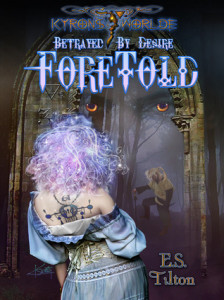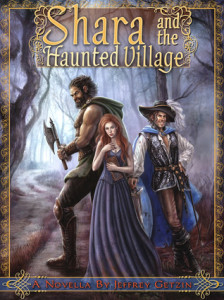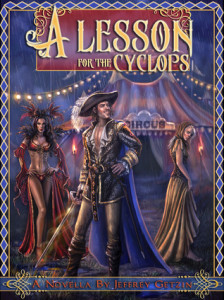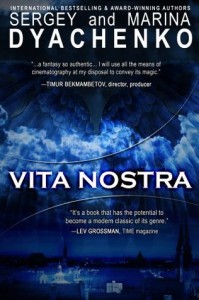 I grabbed Betrayed By Desire, by E.S. Tilton from the Amazon free list.
I grabbed Betrayed By Desire, by E.S. Tilton from the Amazon free list.
Description from Goodreads:
Llayentia’s outcast psychics foresee destruction at the finish of nearly all time streams. Grim with determination, The Seven plot to protect their world…at all cost.
Kyra Atar is one irresistible assassin. And she knows it. Wielding freni-kyn illusions, she slips into the persona of anyone she wants…with one exception…herself.
Recruited into a life he despises, illegal half-breed Tahrek Mitan shifts from assignment to assignment without hope of relief. His newest job is simple. Betray and execute a fellow assassin…Kyra.
While struggling for survival the two must defeat the deadliest stalker of all: forbidden desire.
Review:
This was an entertaining enough read. It has an interesting world, interesting species, and an interesting plot. After a disjointed and confusing start, I spent the first half of the book really enjoying myself. However, around the 65% mark the book started to drift and I started to lose interest.
The issue is that, while the book started out with assassins doing cool assassin things, it then hit a strange domestic plateau in which very little relevant to the preceding story happened—reconnecting with friends, learning about herbs, setting up trading routes, etc. Not only did this take up a lot of time in an already gangly and too long story, I was left thinking, ‘What happened to the book I was reading? This doesn’t seem to be the same one.’ And it never got back to the first one. The book has a very abrupt ending, leaving all the threads open (that’s right, nothing concludes) and the story at the end feels very different from the one that began.
You see, this book takes the long view of history, which seems to give it permission to diverge from its primary plot-line regularly. I wish it hadn’t, but that’s just me. To elaborate, the book has five prologues. (Don’t ask me why, I don’t know either, but I’d have been lost if I hadn’t read them.) Between prologues four and five, 253 years passed. Then, between the end of prologue 5 and beginning of chapter one, 2,658 years passed!
Considering the length of time covered in the first 10% of the book, it probably shouldn’t be surprising that the remaining story couldn’t be contained within one volume. However, it seemed to me that it could have been condensed a bit. Long, LONG passages were dedicated to comparatively unimportant things, bonding ceremony preparations or dreams, for example, and most of these were contained within the not primary plot portions of the book.
My point is that in a story that already covered thousands of years and looks to take many more years to conclude, such forays into detailed mundanity need to either be curtailed or readers need to understand in advance that this is going to be a very long series, with each book containing only a fragment of the larger story but a lot of detail on the rest of the characters’ lives. Expect no closure here.
As an example, the seven children being bred in prologue one never appear anywhere in the book, or at least nowhere that the reader knows that they are one of the seven. This whole prologue seems to be a set up for something that will happen in some future book. There were a number of small things like this. The bit about a man killing women who remind him of Kyra, is another example. He was never mentioned after his brief 3-4 page blip into existence. (Though reading the blurb of book two, I bet he shows up there.) But scattered through the book were random, anchorless reveals that serve no apparent purpose.
Now, I must admit that I loved Tahrek. He’s broken, but extremely loyal and caring, not to mention badass. I melted a bit every-time he spoke. I liked Kyra, but I didn’t love her. She seemed inconsistent to me. One minute throwing herself at Tahrek sexually, the next accusing him of taking advantage of her. For half the book, she was a standoffish sort, the last half a giggling, hugging sort.
I think something else that contributed to the different feel of the first and second half of the book was that toward the end, once the Kyra and Tahrek were comfortable with one another, they started using names a lot. This often breaks the flow of dialogue and feels unnatural. I didn’t notice this pesky problem in the beginning, but I found myself gritting my teeth with it at the end.
With the exception of the too frequent names, I thought most of the actual writing was perfectly passable. The POVs jumped around a lot, but it wasn’t too disruptive. There were some random mysterious messages in a rough-paper-like graphic that felt really gimmicky and out of place. Plus, whomever the communications are between is never directly addressed, leaving the reader to wonder what they’re all about. (One more reveal for some future book maybe.)
So, in the end, I imagine this will be a really interesting SERIES, but as an individual book, I was disappointed. There is just so much set up for a really long and detailed story that I feel like someone handed me the first 300 pages of a 4,000 page epic. But if you’re willing to dedicate yourself to a lengthy series of reads, this one might be worth picking up.




